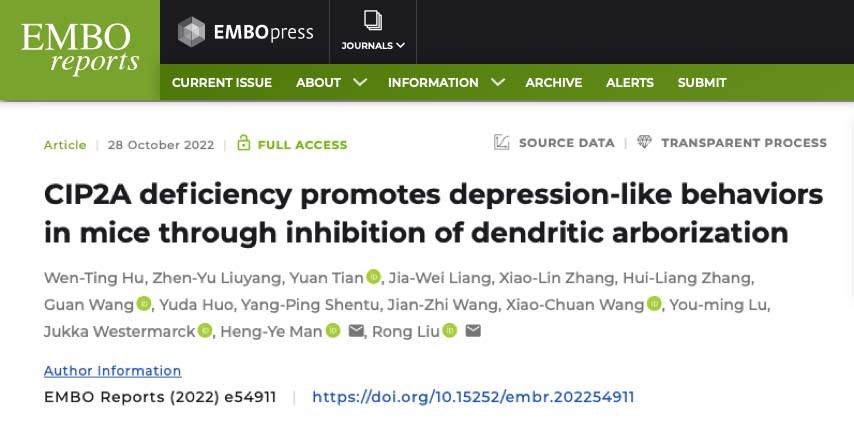On October 28, Professor Rong LIU's team at the Department of Pathophysiology, School of Basic Medicine, published their latest findings in EMBO reports, one of five journals of EMBO Press. Their Paper which is entitled "CIP2A deficiency promotes depression-like behaviors in mice through inhibition of dendritic arborization" reveals a novel mechanism that CIP2A deficiency promotes depression through the regulation of PP2A-AKT signaling and dendritic arborization.

Major depressive disorder (MDD) is a complex and highly prevalent mental illness. As social competition becomes increasingly intense in the wake of a more industrialized society, the incidence of MDD also grows year by year. The World Health Organization estimates that 3%-5% people worldwide are tortured by MDD. Since the outbreak of Covid-19, the global incidence of MDD has reached a high level due to the impact of social isolation and economic recession. MDD severely limits psychosocial functioning and decreases life quality of the affected individual, thus leading to a sharp rise in suicide rate. At present, the treatment of depression mainly relies on the regulation of the monoamine system. However, about 30% of depression patients are partially or completely resistant to this treatment. Therefore, it is of great urgency to further investigate the molecular mechanisms of MDD so as to find new ways for intervention and treatment.
Dendrite, a short branch at the end of a nerve cell, serves as a vital structure which receives signals from other cells, maintains intercellular connections and forms neural circuit. Impaired brain plasticity and dendritic structures are characteristic pathology in MDD. Major depression patients are plagued by significant dendritic atrophy in the prefrontal cortex (PFC) and hippocampus. Elucidation of the mechanisms underlying the deficits in dendritic development may disclose new molecular targets in MDD treatment. AKT, the serine/threonine kinase which is also known as protein kinase B, is an important regulator of dendritic arborization/development and synaptogenesis. Cancerous inhibitor of PP2A (CIP2A), an endogenous inhibitor of protein phosphatase 2A (PP2A), is found to play a key role in dendritic development of CNS neurons. CIP2A stimulates AKT activity and promotes dendritic development. The deletion of CIP2A leads to depression-like behaviors in mice and impaired dendritic arborization. Reactivation of AKT in CIP2A-deficient mice reversed these changes. Above-mentioned findings confirm that the CIP2A-PP2A-AKT signaling pathway was involved in the development of dendrites and the pathogenesis of depression. Their study discloses a new mechanism of depression and a possible new direction for depression treatment in clinical research.

This work was supported by the National Natural Science Foundation of China and was completed together by the team of Professor Rong Liu from School of Basic Medicine, Tongji Medical College, Huazhong University of Science and Technology and the team of Professor Hengye Man from Boston University. Huazhong University of Science and Technology is the first completion unit. PhD students Wenting Hu and Yangzhenyu Liu from the Department of Pathophysiology, School of Basic Medicine, are the co-first authors. Prof. Rong Liu, the backbone of Neurological Diseases Key Laboratory recognized by the Ministry of Education and member of the Chinese Association of Pathophysiology, has led the research team to study the mechanisms of such major neurological diseases as Alzheimer's disease and depression for many years and has reaped fruitful results.
Link to the paper: https://www.embopress.org/doi/full/10.15252/embr.202254911